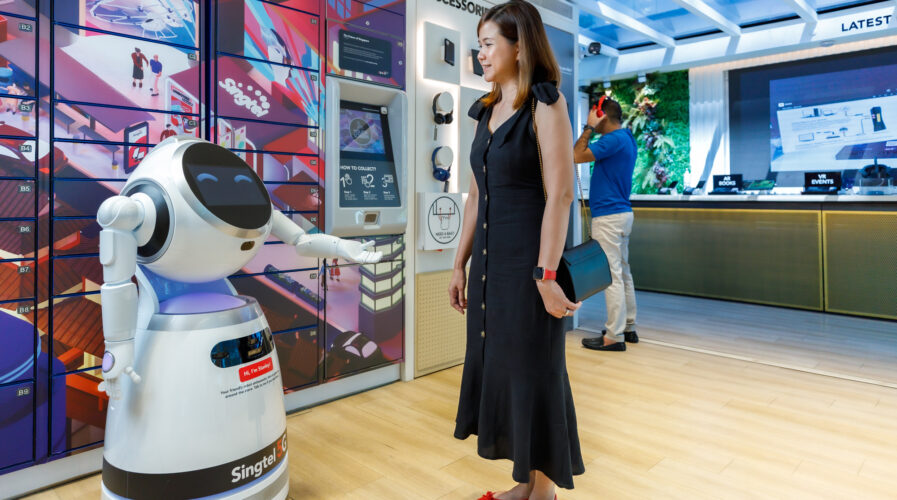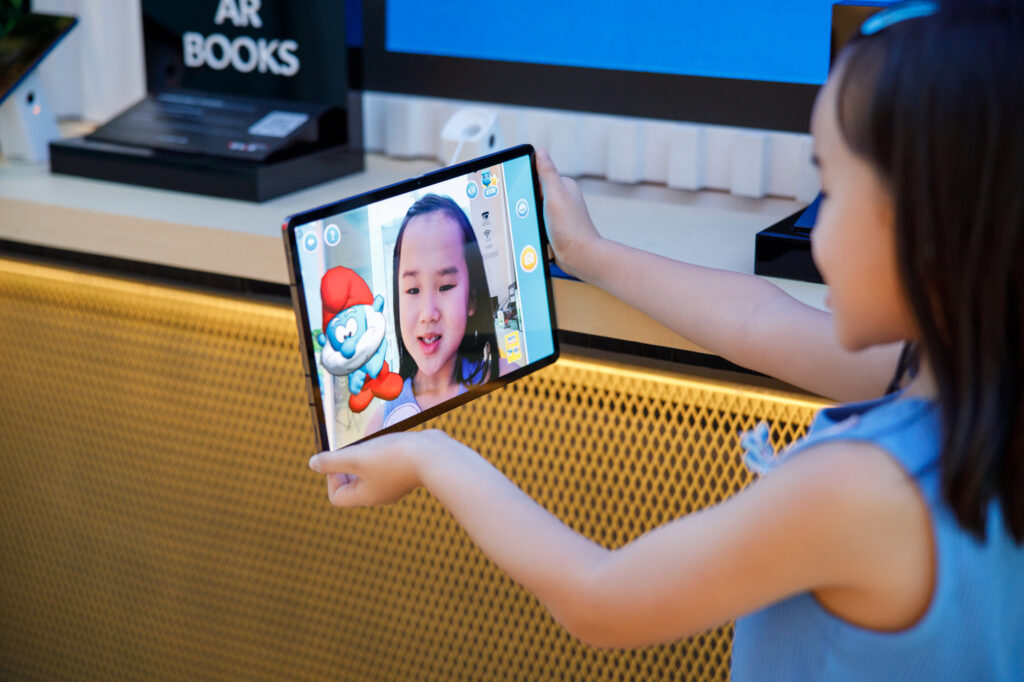
A customer interacts with ‘Stanley’. Source: Singtel
Singtel demos how 5G can transform retail in ‘low-touch’ economy
- 5G could be a boon for physical retailers navigating a contactless or low-touch economy
Singapore telecoms firm Singtel is demonstrating how 5G can transform the retail experience, unveiling a 24-7 unmanned pop-up stall driven by the next-gen cellular technology.
Dubbed 5G Now@UNBOXED, the hyper-connected store gives consumer and retailers a first-hand taste of 5G, and how it can transform and reshape the retailer experience.
The store comes following the launch of Singtel’s 5G NSA network last week and gives the telco a chance to front its wares to consumers. Visitors can enjoy a swift and seamless service from connected kiosks offering sim replacements and device collection. 5G can also power IoT and artificial intelligence, enabling real-time connectivity and analytics in-store. This allows communication between UNBOXED’s roving smart robot ambassador Stanley and 5G virtual assistant Stella at the kiosks, creating a more personalized shopping experience for customers.
Stanley is also looped into the store’s security system to detect customers who are running a temperature, as well as ensuring customers are adhering to social distancing measures. As a next-generation retail concept, the contactless service model shows how 5G can help retailers better adapt and reach their customers in a post-COVID new normal.
“COVID-19 has ushered in a new, digital way of life for many people, accelerating a fundamental shift in the retail industry toward a hybrid online and offline retail model,” said Mr. Yuen Kuan Moon, CEO, Consumer Singapore, Singtel.
“The deployment of 5G at our pop-up store is timely as its ultra-fast speeds and low latency will make the self-serve retail model even more compelling for a digitally-minded set of consumers,” said the Singtel chief.

Interactive 3D reading experience in Singtel’s store. Source: Singtel
The low-touch economy
Indeed, retailers are currently exploring how they can navigate the challenges of a ‘low-touch economy’. But as well as complexity, aiming for contactless experiences brings new opportunities for businesses to be creative and innovate.
Jason Gregory, managing director for FastKey at Singapore-based online property listing platform, PropertyGuru, recently told ZDNet that there is evidence of an appetite for the in-store experience, especially for big-ticket items. He hinted the adoption of immersive technology such as virtual reality (VR) and augmented reality (AR) may help retailers enhance the shopping experience.
Global brands have been quick to adopt next-gen tech to meet consumer expectations. For instance, furniture and bedding company Malouf recently developed a 3D virtual tour of the company’s permanent showroom in Las Vegas. Businesses and shoppers are treated with a 3D tour and can explore the 35,000-square-foot space and the company’s broad product line.
Clothing brands such as Diesel are among many offering shoppers 3D-inspired experiences online as well. Recently, Diesel launched a virtual showroom named HypeRoom, modeled after its flagship store in Milan to offer shoppers a one of a kind digital shopping experience.
READ MORE
- Ethical AI: The renewed importance of safeguarding data and customer privacy in Generative AI applications
- How Japan balances AI-driven opportunities with cybersecurity needs
- Deploying SASE: Benchmarking your approach
- Insurance everywhere all at once: the digital transformation of the APAC insurance industry
- Google parent Alphabet eyes HubSpot: A potential acquisition shaping the future of CRM


